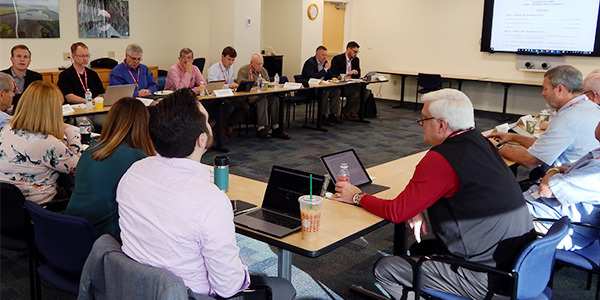JUNO BEACH, Fla. — Convening a Strategic Planning Committee meeting last week in South Florida, SPP Board of Directors Chair Larry Altenbaumer apparently couldn’t resist adding a little local flavor to the proceedings.
Altenbaumer focused the committee on the future and a plan “for how to get there” by quoting from Jimmy Buffett’s “Changes in Latitudes, Changes in Attitudes“:
“Oh, yesterday’s over my shoulder,
So I can’t look back for too long.
There’s too much to see waiting in front of me,
And I know that I just can’t go wrong.”
After quoting Margaritaville’s most famous resident, Altenbaumer told the committee during its Nov. 12 meeting at NextEra Energy’s corporate headquarters that SPP’s new strategic plan needs to focus on what the RTO delivers “that is better than other options that are out there.”
“Focus on our performance and effectiveness and the quality of the services we provide,” he said.
The committee will spend the near term developing an official SPP vision statement. “There’s a sentiment that SPP should consider a vision at this juncture,” Altenbaumer said.
The SPC will begin revising SPP’s strategic plan in April after taking feedback it gathers from the board and Members Committee in January. “Critical areas of focus” will include effective communication, strengthening relationships, a Western strategy and transmission planning in an uncertain future.
SPP Senior Vice President of Engineering Lanny Nickell outlined three “areas of competition” to consider: competition between RTOs, ensuring SPP doesn’t lose load to ERCOT and keeping load where it is.
“How do we compete for loads that are not in an RTO?” he asked, rhetorically. “How do we compete, as a region, for loads that love the renewable resources and low prices? They’re looking for opportunities to add warehouses and data centers. How do we compete for those? As loads move off the transmission system and onto the distribution system, is that an issue we need to look out for, or be aware of, and compete for?”
“If you’re trying to contain costs, you have to make sure you’re keeping all the load you have,” NextEra Energy Resources’ Holly Carias said. After adding Entergy as MISO South in 2013, MISO’s administrative fee fell below SPP’s, she said.
SPP will raise its administrative fee by 9.1% in 2020 to a record 43 cents/MWh. (See “Directors Approve 9.1% Administrative Fee Increase for 2020,” SPP Board of Directors/MC Briefs: Oct. 29, 2019.) That has raised concerns among some members who have seen several loads on the SPP-ERCOT seam transfer into the Texas grid.
“Reality is rate cases,” Southwestern Public Service’s Bill Grant said. “Asking for recovery of all these expenses and having to justify transmission increases … a lot of customers are not enamored with the rising cost of transmission … on their bills.”
Staff Working on HITT Escalation Process
In briefing the committee on the Holistic Integrated Tariff Team’s (HITT) recommendations, COO Carl Monroe described an escalation process that starts with staff that worked on an issue addressing questions around that issue before it potentially ends up at the SPC or before the board.
“We’re trying to get the teams responsible for facilitating the issue to resolve those issues too,” Monroe said. “We suspect there will be times where there are disagreements over whether it’s a good recommendation or being implemented as intended. Is it going in the direction where it will be improving something?”
HITT’s yearlong work resulted in a package of 21 recommendations intended to integrate renewable energy’s growth, boost reliability, and improve transmission planning and the wholesale market. The recommendations have since been parceled out to the SPC and other stakeholder groups. (See SPP Board Approves HITT’s Recommendations.)
Several committee members who participated on the HITT pointed out that they agreed on the package as a whole but still had concerns about individual recommendations.
“This very same conversation is reflective of some of the conversations and discussions at HITT. This is the kind of difficulty we saw coming,” said Oklahoma Gas & Electric’s Greg McAuley, who called into the meeting. “These are some very big changes that are being proposed. Without a lot of due diligence or thorough analysis, we can’t say it’s a package deal and it’s all or nothing.”
“Anything that came through the HITT as a recommendation came with the understanding that it was a general idea,” Lincoln Electric System’s Dennis Florom said. “With the development of tariff language that comes through the process, we may end up with something where there is no unity.”
Nickell reminded the committee that the Markets and Operations Policy Committee sets the RTO’s policy.
“HITT didn’t include the full membership. MOPC will have the opportunity to weigh in as a full membership body,” he said. “It’s important that MOPC expresses why or why not a certain policy [being] advocated is better than what the HITT recommended, and the SPC needs to understand that.”
SPC Agrees to 2 HITT Recommendations
The committee approved two actions it was assigned by the HITT: a draft strawman that adds an “understanding and evaluation of technological advances” to SPP’s strategic plan and a continued “high priority” focus on seams issue.
The HITT report identified technological advances as presenting opportunities for SPP “to provide improved service, higher reliability assurance, greater market efficiencies and tools to manage the evolving generation portfolio.” The SPC agreed that staff should report to the committee about potential technological breakthroughs developed through their work with stakeholder groups, NERC, the Electric Power Research Institute, the ISO/RTO Council and other industry groups.
The committee agreed SPP should continue to “foster mutually beneficial cooperative and joint transmission projects with its neighboring systems to support broader interregional planning.” The comprehensive effort should include identifying how to plan, estimate and “optimize” the facilities on an interregional level.
— Tom Kleckner







